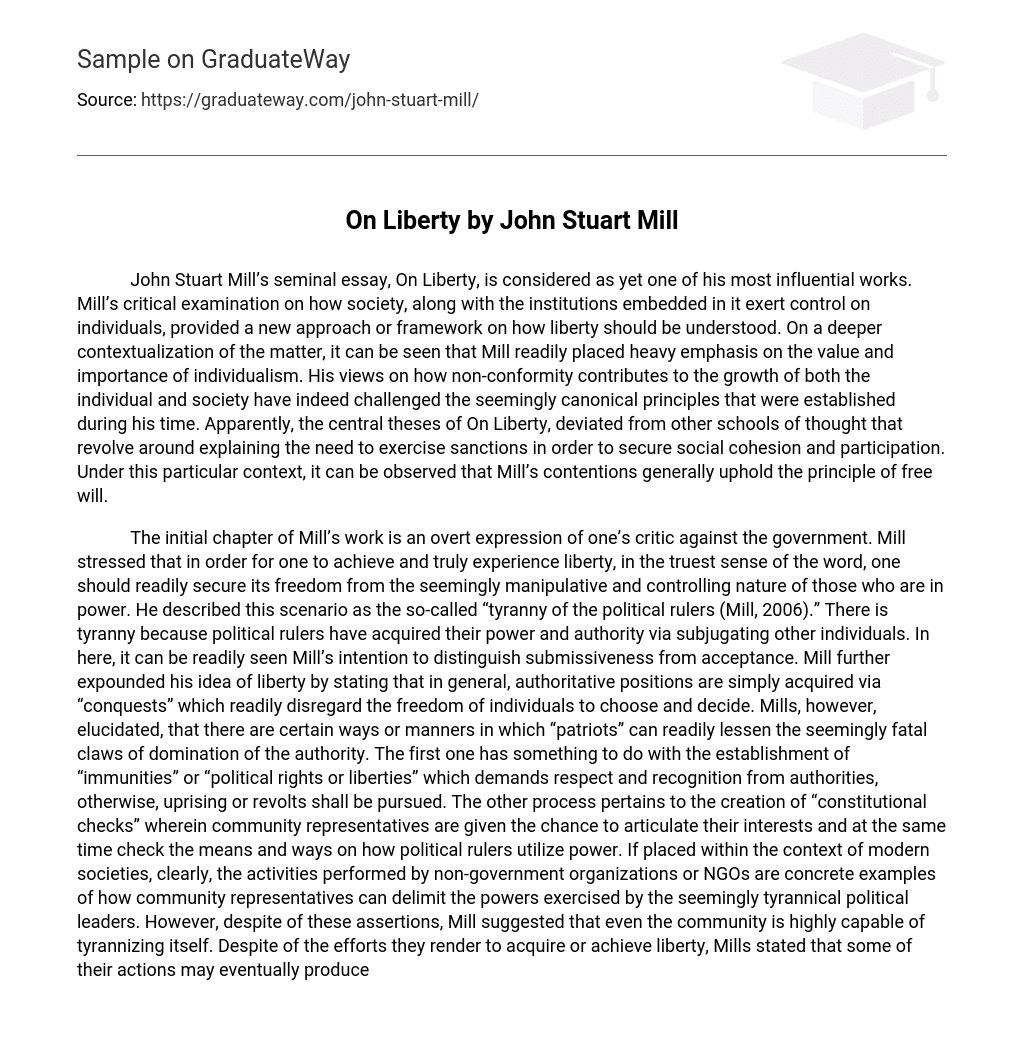John Stuart Mill’s seminal essay, On Liberty, is considered as yet one of his most influential works. Mill’s critical examination on how society, along with the institutions embedded in it exert control on individuals, provided a new approach or framework on how liberty should be understood. On a deeper contextualization of the matter, it can be seen that Mill readily placed heavy emphasis on the value and importance of individualism. His views on how non-conformity contributes to the growth of both the individual and society have indeed challenged the seemingly canonical principles that were established during his time. Apparently, the central theses of On Liberty, deviated from other schools of thought that revolve around explaining the need to exercise sanctions in order to secure social cohesion and participation. Under this particular context, it can be observed that Mill’s contentions generally uphold the principle of free will.
The initial chapter of Mill’s work is an overt expression of one’s critic against the government. Mill stressed that in order for one to achieve and truly experience liberty, in the truest sense of the word, one should readily secure its freedom from the seemingly manipulative and controlling nature of those who are in power. He described this scenario as the so-called “tyranny of the political rulers (Mill, 2006).” There is tyranny because political rulers have acquired their power and authority via subjugating other individuals. In here, it can be readily seen Mill’s intention to distinguish submissiveness from acceptance. Mill further expounded his idea of liberty by stating that in general, authoritative positions are simply acquired via “conquests” which readily disregard the freedom of individuals to choose and decide. Mills, however, elucidated, that there are certain ways or manners in which “patriots” can readily lessen the seemingly fatal claws of domination of the authority. The first one has something to do with the establishment of “immunities” or “political rights or liberties” which demands respect and recognition from authorities, otherwise, uprising or revolts shall be pursued. The other process pertains to the creation of “constitutional checks” wherein community representatives are given the chance to articulate their interests and at the same time check the means and ways on how political rulers utilize power. If placed within the context of modern societies, clearly, the activities performed by non-government organizations or NGOs are concrete examples of how community representatives can delimit the powers exercised by the seemingly tyrannical political leaders. However, despite of these assertions, Mill suggested that even the community is highly capable of tyrannizing itself. Despite of the efforts they render to acquire or achieve liberty, Mills stated that some of their actions may eventually produce a boomerang effect.
The boomerang effect that Mill pertained to is the shaping of public opinion. Since public opinion reflects the views of the general public, this too can prohibit an individual from experiencing liberty. He argued that public opinion does not necessarily equate to absolute truth, thus to prevent an individual from expressing his own thoughts and views is deemed unforgivable. In here, Mill suggested that unorthodox opinions may actually represent the truth. In addition to that, he also explained that members of society are prone to committing mistakes. Their present belief systems are not exempt from being disputed or revoked. This scenario therefore does not give the general public to condemn or force other members of society to silence their respective views and opinions. But more than that, Mill also stressed that non-conformist perspectives are instrumental to society’s growth and development as the exchange of ideas bring forth new knowledge and information. Also, it can be observed that as societal members engage in opinion sharing, this also paves the way for more interaction and socialization, which are highly necessary in preventing social divisions and fragmentation.
In the event wherein differing opinions are already recognized, Mill now turned to the importance and value of individuality. In as far as Mill is concerned, individuality is the ability to act according to one’s judgment and not because they are merely guided by the norms and traditions that are institutionalized by society. However, Mill was also cognizant of the fact of how society perceives individualism. He shared that in many cases; the expression of individuality is belittled and is subjected to derogatory positions. According to Mill, the reason behind this is that society and its members often see individuality as an impending threat. This scenario is also reflective in modern-day societies. Ideas and practices that are often misunderstood are frequently labeled as something that offends the community’s social and moral sensibilities. But then again, Mill argued that individualism can be a hodge-podge of new knowledge and information.
Meanwhile, it is apparent that Mill’s emphases on liberty and individualism seem to create a demarcating line between societies and individual, he stressed that it is still the individual’s duty and responsibility to uphold the good of society. However, doing this does not translate to dictating and preventing mankind from pursuing his or her respective interests. Instead he maintained that individuals should be readily allowed to explore different terrains and at the same time championing the interests of society. On a critical examination, this principle is somehow synonymous to Adam Smith’s idea of the invisible hand wherein the pursuit of individual or personal interests would soon produce results that are beneficial to society as well (Wood, 1993).
Indeed, On Liberty is an exemplary and radical work. John Stuart Mill’s contentions can be described as something that is way ahead of his time. It cannot be denied that his essay has largely contributed to the development of other schools of thought and sociological theories. Evidently, On Liberty gave a new face on how liberty, freedom and individuality can be practiced and achieved.
References
Mill, J. (2006) On Liberty. Massachusetts: Adamant Media Corporation
Wood, J. (1993). Adam Smith. London: Routledge





